Twilight of the Anti-Semites
“Whoever believed he had understood something of me,” Nietzsche writes in Ecce Homo, “had made me . . . after his own image—not infrequently the antithesis of me.” He went on to say that to misinterpret his books was to commit a “sin” against them. The chapter in question is audaciously titled “Why I Write Such Good Books,” but shining through the conceit is Nietzsche’s awareness that his cryptic and often contradictory writings could lead interpreters in wildly divergent directions. Indeed, he had no way of knowing just how variegated his interpreters would be: Everyone from fascists to liberal democrats, nationalists to cosmopolitans, peaceniks to warmongers would use Nietzsche’s works in support of their causes.
But on one topic in particular—Jews and Judaism—Nietzsche has been particularly puzzling. This is, after all, a man who praises the Jews in The Antichrist as “a people gifted with the very strongest vitality” while decrying the “evil-smelling mess of Jewish rabbinism and superstition” only a few pages later. The Nazi intelligentsia almost unanimously understood statements in the latter vein to express an authentic anti-Semitism, and they believed that other Nietzschean ideas—authenticity, striving, value creation, and so forth—laid the philosophical foundation for fascism. If Heidegger was to be the living philosopher of the Third Reich, then Nietzsche would be his forbear, the man who had rooted the regime in the twin ideals of fascism and “racial hygiene.”
And yet, to others, Nietzsche was viewed very much the other way around. Although it would be an overstatement to call them Nietzscheans, many of Zionism’s earliest thinkers were deeply influenced by him. Herzl, who was said by his cousin to have “absorbed [Nietzsche’s] style,” got ahold of every Nietzsche volume available. A young Martin Buber set out to translate Thus Spoke Zarathustra into Polish. And Micha Yosef Berdichevsky, who envisioned a Zionism born out of Jewish exceptionalism and empowerment, drew on Nietzsche’s praises of early Judaism’s supposed attachments to life and action; he even made a pilgrimage in 1898 to the fledgling Nietzsche-Archiv in Weimar, where the by-then-insane philosopher was still living with his sister, Elisabeth Förster-Nietzsche. And after the war, the German-American Jewish scholar Walter Kaufmann—who was almost solely responsible for making Nietzsche accessible to English speakers—made a lifelong project out of showing that Nietzsche was, in fact, a philo-Semite.
That Nietzsche’s reception has been so sharply divided between anti-Semitic and philo-Semitic readings—and that both positions can be supported in his scattered remarks about Jews—is the problem that motivates Robert C. Holub’s new book, Nietzsche’s Jewish Problem. For Holub, both sets of interpreters are mistaken because they read their own positions into Nietzsche’s work, rather than understanding the philosopher on—and in—his own terms.
Walter Kaufmann, Henning Ottmann, R. J. Hollingdale, Weaver Santaniello, and others have argued that most of the anti-Semitism in Nietzsche’s works should be attributed not to Friedrich, but to Elisabeth, who was influenced by her anti-Semitic husband, Bernhard Förster, and their mentor Richard Wagner. If this consensus view were true, or even largely true, there wouldn’t be much of a problem in the first place. But in his very first chapter Holub acquits Elisabeth of these charges. Not only did she not doctor her brother’s work in any substantial way, she didn’t even hate Jews. Drawing upon her biography of her brother as well as her private correspondence, Holub argues that Elisabeth Förster-Nietzsche adopted anti-Semitic views only in deference to her husband. But after Bernhard died, which was before she began caring for her unstable brother and publishing his work, she “disavowed her former convictions” and became “free from overt, biologically based notions of racism.” The case might not be quite as clear as Holub makes out (he admits that she tampered with Nietzsche’s correspondence at least once, striking a paragraph in which he had blamed anti-Semites for his failure with the critics), but Holub makes a strong argument which is bound to surprise those familiar with the standard account of Nietzsche and his sister.
If Elisabeth did not tamper with her brother’s papers, then Holub has grounds to demand that we take Nietzsche’s public writings both for and against the Jews as authentic. But where did previous scholars go wrong, and where can we learn from their mistakes? Almost all previous scholarship on this matter, according to Holub, either ignored or overlooked the language that Nietzsche used, and the specific “historical and personal circumstances” in which he used it. Therefore, Holub spends the better part of his book tracing Nietzsche’s attitudes toward Jews from his youth up until the loss of his sanity in 1889. In doing so, Holub turns to Nietzsche’s private papers, his marginalia, and, especially, his correspondence.
Nietzsche grew up in Röcken and Naumburg, small Saxon towns with few if any Jewish residents. While it’s true, Holub says, that the “absence of personal contact with Jews often goes hand in hand with irrational fears and prejudice,” the Jewish Question that roiled Germany’s cities was of apparently little relevance to these rural communities. It is not surprising, then, that the papers and correspondence from Nietzsche’s first 20 years contain only a single (though quite vile) mention of a Jew, a fictional one named Itzig, who is thrown out of a “raven-black cantor house,” in a poem Nietzsche wrote when he was 17 or 18.
It was when he entered university, first at Bonn and later at Leipzig, that Nietzsche first encountered both anti-Semitism among his peers and professors, and living, breathing Jews at the Leipzig Fair. The attitudes of his friends and teachers rubbed off, and the Fair Jews repulsed him. He also came under the influence of the works of Arthur Schopenhauer—who reviled Jews despite arguing for their emancipation and assimilation. In short, it is not surprising that he began to disparage Jews in his correspondence, but the anti-Jewish comments from this time consist more, as Holub writes, in “thoughtless decoration” of his prose than in deep antipathy. The important point, however, is that Holub has shown that Nietzsche was influenced by his anti-Semitic milieu from the outset of his adult intellectual life.
This last point turns out to be of more than passing interest, because it shows that Nietzsche had been introduced to anti-Jewish prejudice before he ever encountered Richard Wagner, whom he met in 1868, when he was 24. Nietzsche’s famously close friendship with Wagner and his wife, Cosima, is, for Holub, significant because it transformed the casual anti-Jewish attitude of his university years into full-fledged anti-Semitism, complete with suspicions that Jews had too much power and an inborn “sense for money,” both of which they used against non-Jews. At the peak of Wagner’s public influence, in 1870, Nietzsche delivered a lecture on “Socrates and Tragedy” in which he insisted that the “Jewish press” would have deleterious effects on German art in the same way that Socratism had destroyed authentic Greek tragedy. Nietzsche seems to have believed that connecting his academic work on philology and aesthetics to Wagnerian anti-Semitism would impress his new friends. But, to the contrary, the Wagners thought that Nietzsche had taken a step too far. While agreeing with the main point he was making, Cosima wrote to Nietzsche that his lecture was “much too new to be understood by the audience” and that it could jeopardize the Wagners’ entire “program.” He dutifully removed the anti-Semitic spur in the published edition of the lecture.
In 1876, Nietzsche broke with Wagner and his circle, though, according to Holub, it “had nothing to do with Wagner’s attitude toward Jews.” Rather, Nietzsche was nursing an interest in French thought and culture, to which Wagner took Germanic umbrage, while Wagner was experimenting with Christian motifs in his forthcoming opera Parsifal, which Nietzsche found contemptible and would go on to ridicule in his Genealogy of Morals. Nonetheless, the result was that Nietzsche stopped viewing the subjugation of the Jews (which he had endorsed as a part of Wagner’s project of German cultural renewal) as part of his politico-philosophic project. He no longer thought that a return to “natural values”—values founded on strength and vitality—required Jews to be excluded from the community.
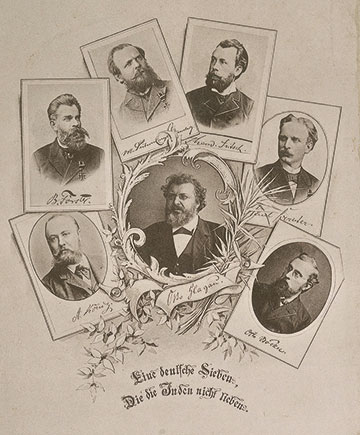
Leading German anti-Semites of the late 1800s. Otto Glagau is at center. Around him, clockwise from lower left: Adolf König, Bernhard Förster,
Max Liebermann von Sonnenberg, Theodor Fritsch, Paul Förster, and Otto Böckel. (Courtesy of Klassik Stiftung Weimar, Goethe-und Schiller-Archiv.)
Drawing almost exclusively on Nietzsche’s private papers, Holub goes on to show that Nietzsche still believed Jews to possess certain stereotypical traits, like the “sense for money.” In contrast to his Wagnerian days, though, Nietzsche refused to join the burgeoning movement of political anti-Semitism of the 1880s. Instead, having become popular with Jewish students in Vienna, and having developed a close friendship with an assimilated German Jew, Paul Rée, Nietzsche began to view intermarriage as the solution to the Jewish Question. “The Germans should breed a ruling caste,” he wrote in a note from 1885, and since Jews “possess inherent abilities that are essential ingredients for a race conducting world politics,” it seemed better for Jews and Germans to be united by blood rather than divided by politics. It is from comments like these, together with detailed accounts of Nietzsche’s brushes with three notable political anti-Semites (his publisher Ernst Schmeitzner, his brother-in-law Bernhard Förster, and the publisher Theodor Fritsch), that Holub comes to his final assessment of Nietzsche’s view of the Jews and Judaism.
Nietzsche, Holub concludes, was not an anti-Semite in the late-19th-century sense of the term. After briefly flirting with that ideology during his Wagner years, Nietzsche “recoil[ed] from the crude excesses” of such political anti-Semitism, finding it vulgar and, probably, unphilosophical. But Nietzsche, Holub is quick to qualify, was no friend to the Jews, either. Even his seemingly positive remarks “often amount[ed] to a validation of existing stereotypes.” Moreover, Nietzsche held views that “we would categorize today as biased and perhaps even racist.” Contextualizing Nietzsche turns out to mean that he was not an anti-Semite then, but that he would be now.
Near the end of Nietzsche’s Jewish Problem, as we draw biographically closer to the philosopher’s period of insanity at the end of his life, the book is taken over by the sense that the examination thus far has been insufficiently philosophical. Its final chapter, in contrast to every preceding chapter, is devoted to examining Nietzsche’s published works rather than his private letters, in particular the Genealogy of Morals and The Antichrist.
Nietzsche’s basic philosophical project—encapsulated by the title Der Antichrist, which could be translated as “The Anti-Christian” just as well as “The Antichrist”—is to purge the world of Christian values and return to one in which “natural” values guide human life. “Christian[ity],” he writes, “is all hatred of the intellect, of pride, of courage, of freedom, of intellectual libertinage; Christian[ity] is all hatred of the senses, of joy in the senses, of joy in general.” To understand (and defeat) Christianity, though, one must understand the “soil from which it sprung”: Judaism.
Biblical Judaism, according to Nietzsche, slowly developed “slavish” values and, in so doing, eventually launched a Christian revolution. The significance of Nietzsche’s schema here must not be overlooked. At first blush, Nietzsche’s view would seem to put him just as much at odds with Jews as he is with Christians. For him, Christianity is the “one great curse” visited upon humanity, and it was visited upon humanity by the Jews.
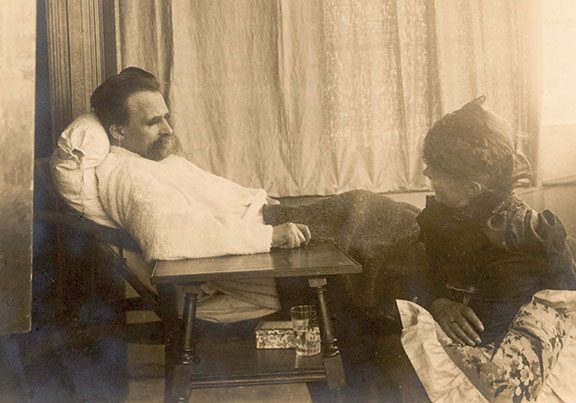
But if Jews are ultimately responsible for Christianity, why does Nietzsche say things such as “The Jews are the most remarkable people in the history of the world” since they chose national survival “at any price”? How can the Jews simultaneously “attempt to denaturize all natural values” via the birth of Christianity while also maintaining the “natural attitude” of affirming communal life? Such remarks—and the fact that the Jewish religion persevered for two millennia after the establishment of Christianity, no small feat even in the eyes of Nietzsche—show that Nietzsche’s seemingly simple genealogy of morality is, in truth, not simple at all.
Moreover, Nietzsche’s sense of the historical relationship between ancient Jews and modern Jews is less than clear. Are the modern Jews responsible for the curse of Christianity, too? And, if so, how are we to understand Christian anti-Semitism? Nietzsche leaves such questions unanswered, but does not leave his readers guessing as to whether he harbors any disdain for modern Jewry: “One would as little choose ‘early Christians’ for companions as Polish Jews . . . Neither has a pleasant smell.”
There is a great deal to be sorted out here, but Holub makes little effort to do so. Rather than venturing to understand Nietzsche’s conceptual history of religion, how the Jews fit into it, and how it all squares with his private attitudes, Holub shows only that Nietzsche relied upon an ultimately false and prejudiced theory that the Jews and other Semitic tribes originated with a slavish underclass (the “Chandalas”) in ancient India. In pointing this out, and in going no further in trying to understand Nietzsche’s work from a genuinely philosophical point of view, Holub risks trivializing Nietzsche. There is no doubt that the philosopher’s private prejudices taint his image, but do they help to explain, or undermine, his arguments, and, if the latter, how interesting can he have been as a thinker?
Academics and amateur enthusiasts alike have always wondered what a writer really thought, as opposed to what was put out for public consumption, and sometimes such curiosity bears fruits. The sober investigation of unpublished documents, an endeavor Holub conducts with enthusiasm, is surely a great service to the historical literature, and Nietzsche’s Jewish Problem will likely become the definitive work on its subject. But in seeking to unmask Nietzsche, Holub pushes his published works—the core of his philosophy—out of view.
On the one hand, Nietzsche’s philosophy is itself of interest, and his project of “revaluating all values,” by tearing down the “slave morality” of Christendom, is necessarily connected to Judaism. But for those concerned with that issue, Holub’s study is of little help. It’s very hard to see how Nietzsche’s refusal to remain within the Wagnerian fold, in combination with his employment of certain anti-Jewish stereotypes, helps us make sense of his philosophical-historical understanding of the Jews as “gain[ing] satisfaction from [their] enemies and conquerors only through a radical revaluation of their values . . . an act of the most deliberate revenge.”
And, on the other hand, Holub’s study does not help us much in understanding how Nietzsche was received in the 20th century. Anti- and philo-Semitic scholars alike were not provoked by the private correspondence that Holub dutifully wades through. Indeed, they hardly had access to it. Rather, 20th-century readers of Nietzsche found his philosophical work to be compelling. We cannot determine why Nietzsche’s interpreters have disagreed so sharply until we understand how Jews and Judaism fit into his philosophical project.
Holub’s real question turns out to have been whether Nietzsche was, as Nazi intellectuals insisted, one of their own. Though he equivocates a bit—of course we can never really know whether or not Nietzsche would have been persuaded, as Heidegger was, to join the Nazi Party—he shows that there is sufficient evidence to read Nietzsche as “violently antagonistic” to the early political anti-Semitism that gave rise to Nazism. This is a significant conclusion—one that should perhaps help Jewish readers of Nietzsche rest a little easier. And yet, it should be remembered that the temptation to peek behind the veil of Nietzsche’s published work comes with a danger: It is easy to lose sight of why he remains worth reading.
Comments
You must log in to comment Log In
Suggested Reading
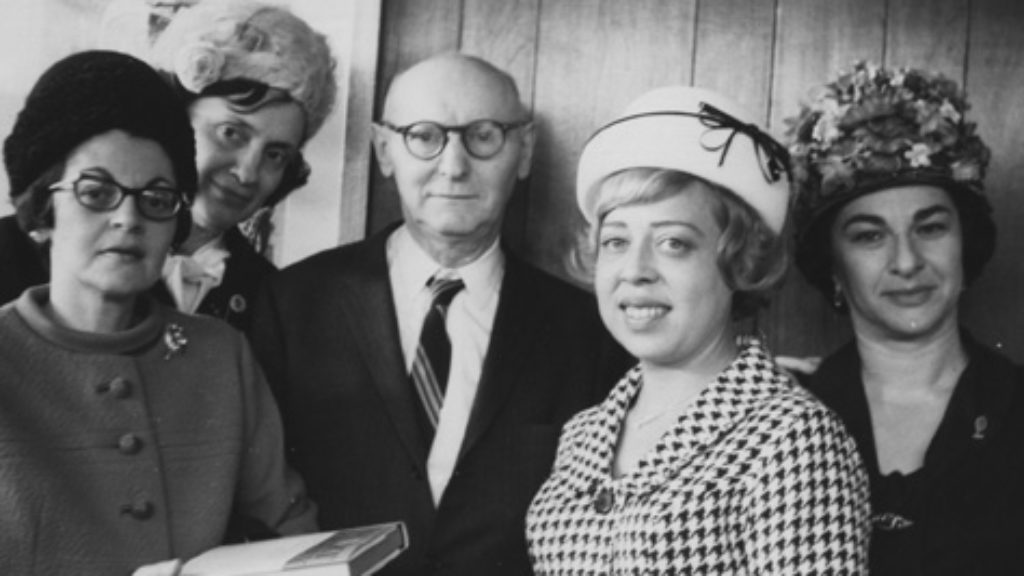
A Harem of Translators
Singer insisted that all foreign-language translations of his work be based on the English versions. And most of them were done by young women who closer to typist-editors than true translators.
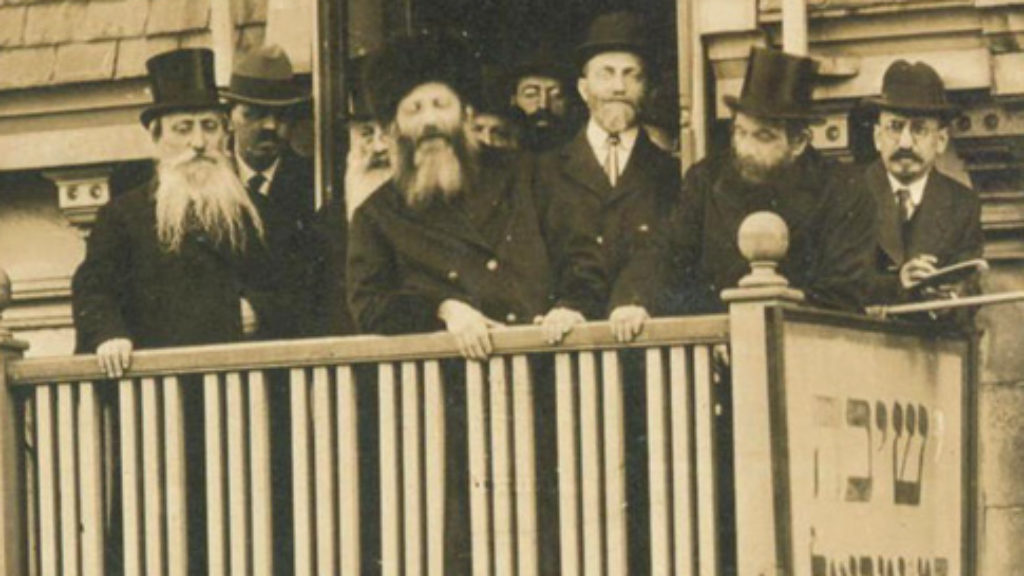
Dialectical Spirit
A new intellectual biography explores the thought and legacy of Rabbi Abraham Isaac Kook.

A Lone Soldier
Every year, when Yom HaZikaron, Israel’s memorial day, rolls around, the author thinks of an idealistic college student named Alex Singer who became a lone soldier in the IDF.
All the Good Things of Spain
The greatest Hebrew poet gets the English bio he deserves.
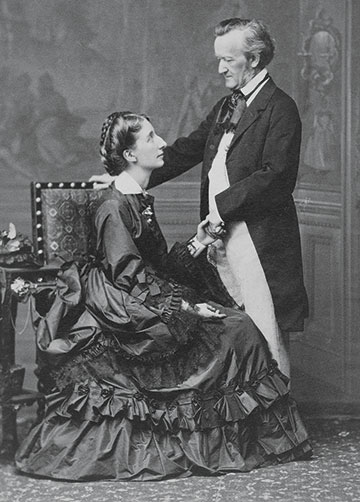
sbeinfeld
I'm surprised that the review doesn't mention Nietzsche's notorious "final" remark on the subject, in a letter to his friend, the theologian Franz Overbeck and his wife, dated January 4, 1889: "...just now I am having all the anti-Semites shot". True, Nietzsche was writing all sorts of strange letters at the time, but the phrase does shed light on his feelings in his later years. (I'm assuming that Holub does mention the letter in his book.)